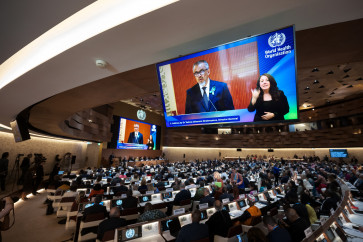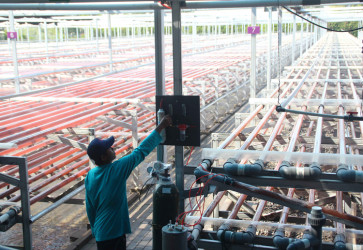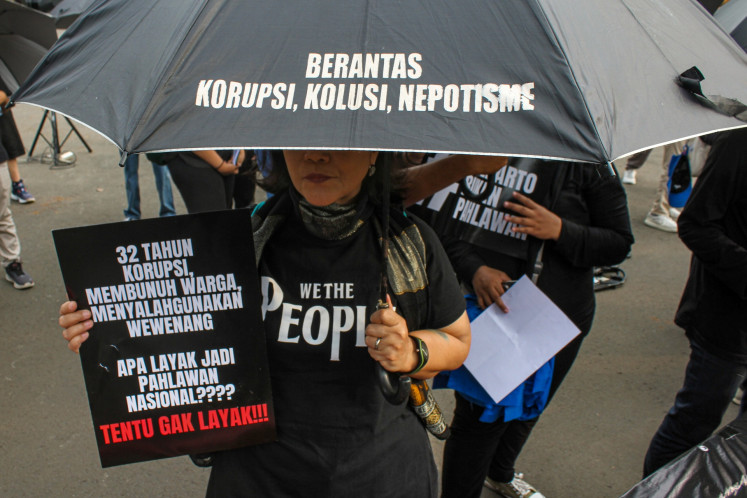Spiritual healing: Generating hope for everyone
A woman distributes flowers to a public bus’ passengers in Jakarta during a campaign to observe the World Cancer Day, which falls on Feb
Change text size
Gift Premium Articles
to Anyone

A
a href="http://">A woman distributes flowers to a public bus’ passengers in Jakarta during a campaign to observe the World Cancer Day, which falls on Feb. 4. JP/Nurhayati
Pain management plays an integral role in preparing the terminally ill for how to best to deal with the approach of death while raising their quality of life.
On a warm Sunday morning at Brahma Kumaris Indonesia Foundation in South Jakarta, Roger Cole speaks to a small audience of some 20 people about the power of inner healing and peace.
He communicates the profound journey he has experienced in the last 26 years during which he has discovered the universality of healing, of peace, and of eternal love.
He teaches the group how to find their inner strength, and then the different ways they can generate hope out of their experiences. He also tells them that fear is the source of most of their grief, and that to be free of fear, they must first accept it, then process it.
At the end of the session, Roger asks his audience to meditate with him. As he assumes his meditation position in front of the room, he is bathed in a ray of red light that shines from a bulb nearby.
A soothing ambiance ensues, and in his soft — yet reassuring — voice, he guides everyone in the room to walk past the dark forest filled with their own fear and despair into the beautiful garden that supposedly generates endless joy and happiness.
“As a medical doctor, I used to deal with people the same way I dealt with diseases,” says Roger. “I treated my patients by giving them medications and surgery when and if needed.”
Then, he realized how impersonal his method was and wondered if there wasn’t something more he could do to better serve his patients.
“I started listening to them,” Roger adds. “And I discovered that what these patients wanted more than anything at this stage of their lives was to be listened to, rather than talked to.”
Roger, who is an Australian oncologist and palliative care physician, has been actively teaching palliative care in Illawarra in New South Wales since 1992 and has produced three books on the issue which immediately became international bestsellers.
Palliative care is considered part of a medical treatment which incorporates holistic measures with the purpose of helping patients and their families come to terms with the disease rather than providing a cure for, or reverse the progression of an illness.
Palliative care does not necessarily cater to patients with terminal illnesses only, but also patients with non-lethal diseases who must deal with long-term effects of the diseases. Though, Roger is better known for his efforts to help patients deal with death, largely due to his profession as an oncologist.
“There are two major things that come across a dying patient which preoccupy him,” says Roger. “One is the fear of pain, or death; and the other is the fear of letting everybody down by not continuing to live.”
Roger argues that death is such a universal thing that almost everybody who deals with it displays similar responses toward it regardless of culture and spiritual beliefs. These responses are also known as the five stages of grief, as introduced by Elizabeth Kubler Ross in 1969, starting with denial, anger, bargaining, depression and acceptance.
However, most people often stop at depression and stay there until the end, while some manage to accept the fact that they are, in fact, dying. Each person goes through the stages differently, depending on the support they receive and their expectation out of the situation.
But Roger says people have the tendency of trying to outsmart the disease and cheat death, which often results in frustration, rather than use their limited time to increase their quality of life.
Studies conducted in the US and UK shows that cancer patients experience less depression and often survive a few months longer than those who receive standard oncologic care.
Meanwhile, The New England Journal of Medicine publishes other studies that further corroborate the first studies on palliative care which conclude the importance of administering the treatment toward both terminal and non-terminal patients with the purpose of minimizing the discomforting experience of pain and suffering.
“The important thing in dealing with patients is to get them and their family on the same page,” says Roger. “Once that happens, and everybody understands what’s going on, they can move on to the next stage.”
During the lecture at Brahma Kumaris Indonesia, Roger suggests to the audience to treat their bodies as vehicles driven by their souls. “When the body dies, the soul continues to live,” he says. “Because the soul is immortal.”
Nevertheless, palliative care is a branch of medical care that is only beginning to be applied here in Indonesia. Due to shortage of experienced staff and lack of program development, most hospitals only provide general counseling services that aim to bridge the communication gap between doctors and patients. Though that doesn’t mean some aren’t trying.
“We have only started doing this in the last two years,” says ‘Nani’, who is in charge of the human resource department at RS Pluit in West Jakarta.
“Most people are not familiar with the concept of palliative care, but for those who have requested the services, they find it to be quite helpful.”
At Mitra Keluarga in Kelapa Gading, North Jakarta, palliative care is currently in development — a step up from the general counseling services.
But the most comprehensive form of palliative care is well applied and executed at RS Dharmais, which also has the reputation as the country’s best facility for treating cancer.
“It is extremely important for our patients to understand that there is the option of receiving counsel from our palliative care team,” says Rahma, a public relations staff at the hospital.
“It’s true that a lot of people don’t see sense in sending in a complete stranger into the room to counsel the patients as well as their family, but all that changes after a few sessions.”
While in Indonesia, Roger also spends some time visiting hospitals and care facilities where he speaks with terminally ill patients and extends his compassion to them.
He says it is imperative that in the process toward acceptance that the patients be given as much information about their condition as possible.
Knowledge breeds confidence, he emphasizes. And he suggests that families should set aside at least one day to talk about what’s going to happen with the patients and cry their hearts out.
“Get a box of tissues, and let it out,” he advises.
“Being around a dying person is not easy,” says Roger. “Some people cry; some others choose to hold back and keep it all inside until they can’t, anymore; and some would try to infuse an unrelenting enthusiasm into the patients.”
All intentions are good, says Roger. “But this may lead to confusion for the patients.”
“That’s why I always encourage them to get on the same page first,” he continues. “These people are just as affected by the process of dying as the patient. So I also try to counsel everyone within the patient’s immediate circle, rather than just the patient.”
More than that, Roger believes that the key to being a good palliative care physician is to know how to deliver information in a positive way. Or, in a way that fosters hope in the patients and their family.
After meditation, toward the end of the talk, a middle-aged woman raises her hand in the air and asks for permission to speak. Roger comes up to her and gently asks what she has to say.
The woman says the meditation helps her gain confidence to be better, while admitting through tears that she had not expected Roger’s session to have had such a profound effect on her.
“Thank you for sharing your experience with us,” says Roger. “Because our healing extends to everyone around us, all around the world.”









